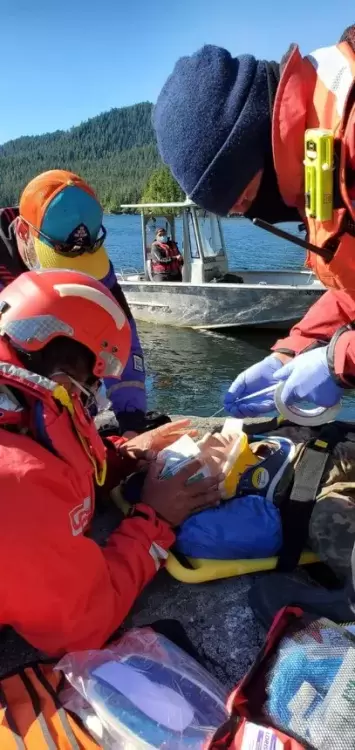Some members from Ahousaht First Nation are involved with a historic initiative.
But a celebration to recognize being part of the first Indigenous-led Canadian Coast Guard Auxiliary will in all likelihood have to wait until the COVID-19 pandemic subsides and it is safe to do so.
Ahousaht is one of the five First Nations that are part of the Coastal Nations Coast Guard Auxiliary (CN-CGA). The CN-CGA is an official partner of the Canadian Coast Guard.
The CN-CGA, incorporated in mid 2018, was established out of the federal government’s $1.5 billion plan to protect the environment and improve marine safety. That plan is dubbed the Oceans Protection Plan.
Federal officials launched the CN-CGA in part because of the October 2015 sinking of Leviathan II, a whale-watching boat. Six people died in that accident near Tofino, but others were saved when Ahousaht members were among the first to respond to the sinking vessel in their waters.
“This is something that many have called for,” said Conrad Cowan, who serves as the CN-CGA’s executive director.
Cowan was the CN-CGA’s first staff hire 18 months ago. A pair of zone co-ordinators have also been brought on board so far, including Stephen Keitlah, who is responsible for the Ahousaht zone.
The CN-CGA currently features 50 members, including nine from Ahousaht. The Nuu-chah-nulth First Nation is also well represented on the CN-CGA’s board of directors by three individuals.
Alex Dick serves as the board’s chair, Luke Swann is the secretary/treasurer and Thomas Campo is a director.
This year’s pandemic, however, forced the entire coast guard auxiliary team into a months-long hiatus.
But Cowan said teams from Ahousaht First Nation and Heiltsuk Nation have been operational in recent weeks in their territorial waters. CN-CGA officials sent out a news release that members from these two First Nations are currently patrolling local waters now.
“We wanted to do community celebrations,” Cowan said. “But that’s just not possible right now.”
Response teams from the First Nations of Nisga’a, Gitxaala and Kitasoo/Xai’xais are also expected to be fully operational in the near future.
Cowan said celebrations in each of the five First Nations that comprise the CN-CGA will likely be held once they can be staged safely.
“This is a good news story and I’m very happy to be a part of it,” he said.
Cowan added the CN-CGA is a rather noteworthy venture. Team members include fishermen, expert mariners and water taxi operators.
“It’s extremely effective,” Cowan said of the team. “It’s saved lives already.”
For example, a man’s overboard distress call was sent out in mid-November. Members of the Heiltsuk Nation team were able to respond and bring the individual to safety.
CN-CGA team members will be on call for whenever they are needed.
“It could be in the day or it could be in the middle of the night,” Cowan said.
CN-CGA members, who are on call 24 hours each day and every day of the year, have been trained in marine search and rescue.
Members from various First Nations who live in coastal British Columbia are traditionally the first to respond to marine emergencies. Their experience at navigating local waters is considered a huge benefit.
A prime example of how First Nations members from coastal communities can be of immeasurable assistance was the Leviathan II accident. Several members from Ahousaht First Nation were the first to arrive and worked at saving lives.
Dick is among those who realize the important roles those from coastal First Nations have.
“I foremost recognize the critical role of First Nation communities as members of the auxiliary in protecting mariners and coastal communities,” he said. “They are simply the most experienced stewards of the marine environment and are unquestionably vital to Canada's marine safety system today.”
Bernadette Jordan, the Minister of Fisheries, Oceans and the Canadian Coast Guard, echoed this sentiment.
“Coastal First Nations in British Columbia are an essential part of the marine search and rescue system in the region,” she said. “They have been stewards of the coastal environment for generations, and they are often the first responders on the water when lives are at risk, particularly in the remote areas along the coastline.”







